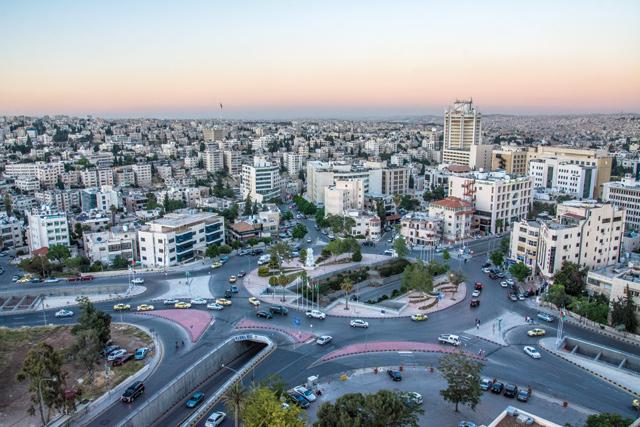You are here
IMF team proposes bringing forward into 2021 part of credit to Jordan
By Mohammad Ghazal - Nov 16,2020 - Last updated at Nov 16,2020

IMF Jordan mission chief Ali Abbas has hailed the Kingdom’s ‘timely’ containment of the COVID-19 pandemic during the first half of the year and the authorities’ ‘robust policy stimulus response’ (Photo by Amjad Ghsoun)
AMMAN — An International Monetary Fund (IMF) team is proposing to bring forward into 2021 a part of IMF credit that was expected to be disbursed to Jordan in the outer years of the $1.3 billion four-year Extended Fund Facility (EFF), to help the Kingdom meet its large financing needs in the wake of the COVID-19 pandemic, according to IMF Jordan mission chief Ali Abbas.
The proposal comes after the IMF team held virtual discussions with the Jordanian authorities and reached a staff-level agreement on the first review of the authorities’ economic reform programme supported by the EFF programme. The agreement is subject to approval to the IMF’s Executive Board.
“The frontloading of IMF support will also provide a signal to other development partners to strengthen their assistance to Jordan at this challenging time,” Abbas said, adding that fiscal targets for 2020 under the EFF programme have also been “significantly” relaxed to support Jordan’s efforts to save lives and livelihoods
“With the COVID second wave still unfolding, we have also agreed with the government to extend into 2021 the flexibility built into the programme to accommodate higher-than-expected COVID-related spending,” Abbas told The Jordan Times in an interview.
He said it was important to limit the crisis-induced rise in Jordan’s public debt through a gradual medium-term fiscal consolidation, starting in 2021.
“There is agreement that this consolidation should protect the poor and be growth-friendly,” he added. Jordan’s overall public debt, excluding government debt holdings by the Social Security Investment Fund, reached JD26.780 billion at the end of July, representing 86.4 per cent of GDP compared with JD23.958 billion at the end of 2019.
“The surge in public debt was expected, given the impact of the pandemic on the economy and public sector balances. Debt targets have been adjusted post-COVID and we now expect public debt [which excludes government debt holdings by the Social Security Investment Fund] to peak at 90 per cent of GDP and decline over the course of the programme to around 80 per cent of GDP by 2025,” he said.
To realise this objective, the authorities are focusing on equitable tax reforms, aimed at tackling evasion, closing loopholes and broadening the tax base. Public expenditure reforms will aim to create space for social spending and deliver a more efficient and transparent public sector.
The main objectives of the Jordanian programme supported by the EFF remain unchanged, “but the challenges brought on by COVID means some reforms may face some delays due to implementation constraints as the authorities respond to the health and economic fallout of the pandemic”.
“The reforms identified under the EFF remain critical, but priority is given to those that would help support the most vulnerable and mitigate long-term damage to the economy and employment from the crisis,” he said.
Jordan’s ongoing reforms to tackle tax evasion, close tax loopholes, “which typically favour large corporations and the rich”, and broaden the tax base are key to mobilising resources needed to support the most vulnerable and undertake growth-enhancing public investment.
Electricity sector reforms aimed at improving National Electric Power Company’s finances and reducing the cost of electricity for key businesses have also become “more pressing”.
The programme’s remaining objectives — to reform the electricity and water sectors, boost employment, especially of women and the youth, enhance governance and transparency and improve the business climate — remain unchanged, but the urgency of reform has increased, Abbas said.
Jordan’s “timely” containment of the COVID-19 pandemic during the first half of the year, and the authorities’ “robust policy stimulus response”, have helped save lives and jobs, he said.
“Specifically, the authorities’ targeted stimulus measures softened the early impact of the shock on the economy. This is why we have revised our forecast for the economic contraction in 2020 from 5 per cent to 3 per cent. Still, the crisis has taken a toll. Unemployment has surged to a record high of 23 per cent, tourism and remittances have declined pushing the current account deficit to around 7 per cent of GDP, and revenues of the central government and of other public sector entities have dropped,” Abbas said.
However, the outlook for Jordan’s economy is subject to significant uncertainties as a more exacting second COVID wave unravels.
“Our central scenario is that real growth will recover to 2.5 per cent in 2021. The current account deficit will remain around the same level as in 2020, as the expected recovery in tourism will be largely offset by increases in imports,” Abbas said.
International reserves are expected to remain adequate at around 100 per cent of the IMF’s reserve adequacy metric, and should provide continued credibility to the peg to the dollar. Unemployment is expected to recede with the recovery, but one-off policies aimed at preserving jobs and supporting employers during the crisis will remain important to limit a long-term decline in employment.
By relaxing the 2020 fiscal targets, and providing for gradual return to consolidation, the IMF programme supports the authorities’ efforts to protect jobs and the recovery as unemployment has increased from 19 to 23 per cent in the second quarter as a result of the COVID shock; and now exceeds 50 per cent for the youth.
Female labour participation, already among the lowest in the region, is likely to decline even further, as women are being disproportionately impacted by the crisis.
To address the issue, Jordan needs to invest in technical and vocational training programmes, to help close the skill gap and prepare young Jordanians for in-demand jobs. The Kingdom also needs to extend reduced social security contributions to startups in all economic sectors, better align public sector compensation and benefits to comparable jobs in the private sector.
The government should also reduce disincentives for private sector employment and job creation and reduce red tape and cumbersome licensing requirements, in addition to modernising the insolvency and competition frameworks to remove obstacles to entrepreneurship.
He added that governance reforms are central to the programme as fostering public trust is a key requirement both for supporting growth and maintaining public support and traction on key reforms.
‘Support from international partners crucial’
The COVID pandemic has significantly increased Jordan’s financing needs and robust financial support from multilateral and official bilateral lenders will be critical in the period ahead and may need to be stepped up in the event of a more protracted downturn.
In addition, continued capacity building and technical assistance are necessary to help the authorities maintain momentum of reform implementation.
‘One-off, well-targeted stimulus’
Jordan’s measures were timely and well-targeted. In addition to the strong containment measures, the authorities established a fund to cover emergency medical outlays, exempted medical supplies from sales tax, deferred tax payments, temporarily reduced consumption tax rates on the badly hit tourism sector, and increased social protection spending.
The Central Bank reduced policy rates by 150 basis points, reserve requirements for bank by 2 per cent, provided liquidity to banks, allowed a rescheduling of loans, and supported small- and medium-sized enterprises and affected businesses with low cost credit
It is important that stimulus measures remain one-off and well-targeted. To this end, the authorities’ plan to gradually reduce the fiscal deficit and unwind the financial stimuli as the recovery becomes entrenched is appropriate, the IMF mission chief said.
Structural reforms aimed at supporting employment, especially of women and the youth, and reducing the cost of doing business are now more urgent to help promote inclusive growth and address the distributional implications of the crisis.
‘IMF stands by Jordan’
The pandemic has put all countries in a difficult position where they have to balance health and economic imperatives. This challenge has become more difficult in the context of the second COVID wave, as households and corporations are already strained by the economic toll of the first COVID wave. Targeted containment policies have become more common around the world to help save lives, while also preserving livelihoods.
“Jordan has shown an unusual capacity over the years to weather sizeable external shocks, and this crisis should not be any different. And it is important for the Jordanian people to know that the fund stands by Jordan at this difficult time,” Abbas said.
Related Articles
AMMAN — An International Monetary Fund (IMF) team led by S.
AMMAN — An International Monetary Fund (IMF) team led by S.
AMMAN — The Executive Board of the International Monetary Fund (IMF) on Tuesday completed the first review of Jordan’s performance under the













